She Spelled Trouble For Every Guy That Made A Play For Her!
1946’s Whistle Stop is usually remembered today – if at all- as the big break for Ava Gardner. And that remains one of the few memorable tidbits of what on the surface should have been a fairly memorable picture.
Based on the novel of the same name by Maritta Wolff, Whistle Stop tends to leave one bewildered and more than a bit confused, because frankly much of the film is simply unexplainable. Ava Gardner is Mary, and as the movie opens she is returning from a (presumably) self imposed exile to the big city of Chicago. Why she left is alluded to in the way of a flashback, but no indication is made of why she comes back.
George Raft is Kenny, Mary’s one time boyfriend and general louse around town. Kenny generally drinks and womanizes his way around the sleepy little town and this is presumably why Mary left in the first place. Tim Conway is Lew, a fairly successful businessman about town, owning both a nightclub and sponsoring an annual carnival.
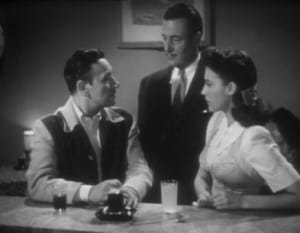 Mary tries to reconcile with Kenny but becomes in dalliances with both men. What she sees in either of them is never clear and her emotions flit from one to the other with a rapid swirl only surpassed but the sound of the toilet in your bathroom. She doesn’t seem to know what she wants, which could allude to quite a few things, but like most other things in Whistle Stop, there are not even any attempts at answers.
Mary tries to reconcile with Kenny but becomes in dalliances with both men. What she sees in either of them is never clear and her emotions flit from one to the other with a rapid swirl only surpassed but the sound of the toilet in your bathroom. She doesn’t seem to know what she wants, which could allude to quite a few things, but like most other things in Whistle Stop, there are not even any attempts at answers.
Outside of Gardner’s emergence as a star in one of her first credited roles the only bright spot is Victor McLaglen as Gitlo. Gitlo is perhaps the only dynamic character in the film. He has had some trouble with the law in his past (and present), and works the bar in Lew’s nightclub. Though credited as part of the supporting cast, he is nigh on stealing away the entire picture.
As Kenny and Lew battle for Mary’s charms, Gitlo convinces that a good way to win this competition of indifference would be to rub out Lew. They concoct a plan to not only rob him of the take from his recent carnival, but also to make him disappear. Mary figures out the plan and shares everything with Lew, so of course it isn’t long until Lew turns the tables on the two and frames them for murder.
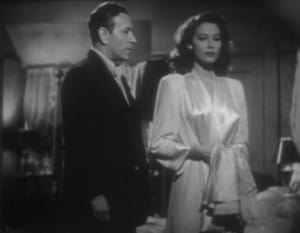 On the run from the police (and how did they find out about the murder?) Kenny takes a bullet in the arm. After dropping Kenny off with a friend in Detroit(!) Lew and Gitmo manage to kill each other in a wonderfully mis-staged gunfight. Mary and Kenny head down the road arm in arm to live happily ever after.
On the run from the police (and how did they find out about the murder?) Kenny takes a bullet in the arm. After dropping Kenny off with a friend in Detroit(!) Lew and Gitmo manage to kill each other in a wonderfully mis-staged gunfight. Mary and Kenny head down the road arm in arm to live happily ever after.
Whoa! How many unexplained jumps can we have here? Again, how did the cops find out about the murder Lew frames Gitmo and Kenny with? Why’d Mary foil Kenny and Gitmo’s earlier plot, only to head off with Kenny in the finale? Why did Mary come back to town and what does she see in either of these schlubs- I mean one is a drunk and the other a gangster? Why does no one seem to question where Mary’s money comes from or ponder why she lounges around in a sheer dressing gown constantly?
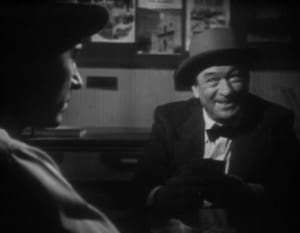 The only character with any type of redeeming qualities is Gitmo, who at least is honest in his lack of ethics or adherence to the law. The others simply make no sense. McLaglen brings his acting chops into play here and lends the only on-screen class to what for the most part remains a picture of unkept potential. Watch for the scene of Gitmo playing cards with Kenny, as it is by far the best of the picture.
The only character with any type of redeeming qualities is Gitmo, who at least is honest in his lack of ethics or adherence to the law. The others simply make no sense. McLaglen brings his acting chops into play here and lends the only on-screen class to what for the most part remains a picture of unkept potential. Watch for the scene of Gitmo playing cards with Kenny, as it is by far the best of the picture.
Raft seems miscast as he is old enough to be Gardner’s father here, but that has been a Hollywood tradition since the beginning of time. Clearly though, here little or no attempt is made to present him in a youthful light. Although already coming down from his peak years of 1940-42, Raft is stuffy and stiff, only coming to life in the fight scenes. Otherwise, he fits into dudsville rather well.
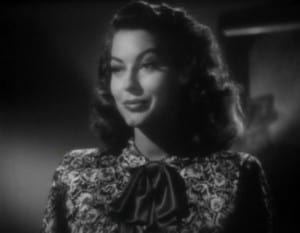 Clearly designed to be the launch pad for Ava Gardner, arguably the last home-grown star of the studio era, Whistle Stop does succeed in pushing her into the spotlight, and wonderfully so. Though still displaying probably more than the studio desired of her native North Carolina drawl, she is photographed wonderfully here.
Clearly designed to be the launch pad for Ava Gardner, arguably the last home-grown star of the studio era, Whistle Stop does succeed in pushing her into the spotlight, and wonderfully so. Though still displaying probably more than the studio desired of her native North Carolina drawl, she is photographed wonderfully here.
But though she looks wondrous, what makes this a plum as well is that this is still the pre-star Ava Gardner. Here she is still in full on development mode, with Ava in some scenes coming across in her mid-50s glory- full of great facial emotions and well-played dialogue. At others (and quite often here, to be honest), she is clearly the scared newcomer looking to find her way in Hollywood.
Filmed on a shoestring budget, there isn’t a lot of money in front of the camera, as sets are shabby and nondescript. For this viewer, it looks like all the budget went into getting a few ‘names’ to add credibility to this farcical tale of mediocrity.
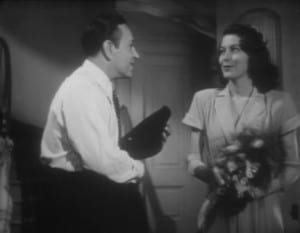 While hinting at and definitely filmed in a style that harkens one to think of noir, the total lack of cohesive plot or engagement with the audience makes Whistle Stop come up far short in most all areas. Not even a relatively atmospheric Dimitri Tiomkin score can do much to help this buzzard become a swan.
While hinting at and definitely filmed in a style that harkens one to think of noir, the total lack of cohesive plot or engagement with the audience makes Whistle Stop come up far short in most all areas. Not even a relatively atmospheric Dimitri Tiomkin score can do much to help this buzzard become a swan.
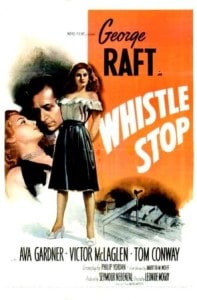
I just watched this as part of the 50 Mystery movie package. I think you had to have read the best-selling novel this was based on to understand what the hell was going on in this picture. As for Raft, I have a hard time taking him seriously under the best of circumstances, and this movie is far from that.
The film is good yes the screenplay is a bit confusing and tangled up in places and inexplicable but showcases the.acting.skills of.the major actors shows fr me the ♥ heart of Ava Gardner a home grown girl with an earthy quality and a heart that is loving and pulsating